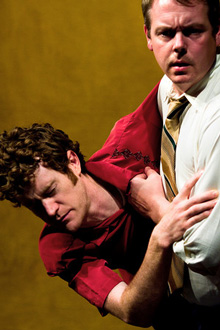
Named for a new type of weather created for a demanding monarch in Dr. Seuss' Bartholomew and the Oobleck, Theater Oobleck has been raining down some of the most unique theater in Chicago for over twenty years.
A Theater Oobleck show, like the loose and heady Strauss at Midnight—a comic nightmare of The Odd Couple in an alternate past, where only Leo Strauss and Saul Bellow can set things right—is born out of a remarkably individual process which contributes Oobleck's signature style and subject matter. In addition to an ensemble composed of performers who also write, design, and share administrative duties for the company (which lacks an artistic director), there are two aspects of the Oobleck process that define their corner of Chicago Theater.
First, every Oobleck show is an original production generated from within the company, and they tend to adhere to a common stylistic recipe. Mickle Maher, a co-founder of the company who agreed to act as a spokesperson for this article, recalls a revealing workshop at Columbia College led by himself and David Isaacson, another Oobleck co-founder. The auditioning students were asked to prepare "a ten minute play with three characters: someone from their family, a figure from mythology, and a figure from history." Says Maher, "that's kind of (an oversimplification of) what an Oobleck show is. It welcomes things from all those realms." They tend to be comic and they tend to be political, but Maher says "There's no effort to exclude. Our nature is really to try to stuff everything into the bag."
The second important trait of the Oobleck process is found in rehearsal: all Oobleck shows are produced without a director. Actors collaborate with each other and the writer (who ideally is also performing in the piece) to bring the script to vibrant life. Maher admits that this is no longer a programmatic rejection of directors in general, it's just another way of doing things (Maher himself holds an M.F.A. in directing). But he is quick to describe the virtues of the approach. By taking full advantage of the talents of everyone onstage, rather than subordinating many voices to a single one, new worlds of ideas open up, "If it's done well and everyone's engaged and speaking their minds as much as possible, and as politely as possible, then when you have a problem onstage—when you have conflicting ideas—nine times out of ten the synthesis of those ideas and the compromise of those ideas is not actually a compromise at all: it's a better idea ."
If these differences—a kind of script and a kind of rehearsal—distinguish the process of creating a Theater Oobleck production, what distinguishes the show itself? Maher suggests that, "despite the ‘messiness' of our shows, there is a certain energy of creation that is absent from a directed work. The collaboration is at its foundation just fundamentally different." Maher compares Theater Oobleck's work to the films of Jean-Luc Goddard, and also to Kung Fu Hustle and the Marx Brothers, and admits that Oobleck does not create work with a specific audience in mind other than "anybody" or "a reasonably curious person."
Theater Oobleck tries to make it easy to satisfy this reasonable curiosity by making all of their shows "pay-what-you-can," meaning that the price of admission is only ever as much as an audience member can pay. "It's really important to the kind of work we do," says Maher, "we're asking people to take a risk.
For more information on Theater Oobleck check out their website, become a fan on Facebook, or follow them on Twitter.
Benno Nelson
